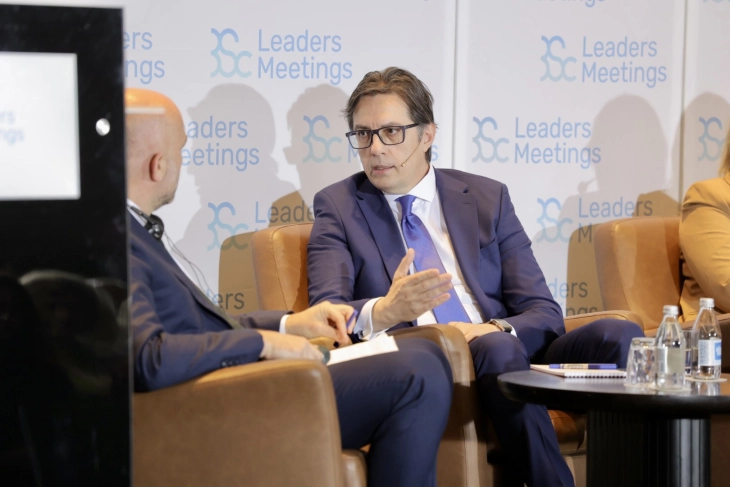Pendarovski: If we weren't in NATO and didn't share information in that system, we wouldn't be able to deal with Russian propaganda
- President Stevo Pendarovski participated on Wednesday at a leaders meeting discussion organized by the Belgrade Centre for Security Policy (BCSP), under the title "Russian Aggression Against Ukraine: New Momentum for the EU Enlargement?", during which he focused on the significance of NATO membership and the influence of Russian propaganda in the Balkans.
- Post By Nevenka Nikolik
- 18:40, 17 May, 2023

Skopje, 17 May 2023 (MIA) - President Stevo Pendarovski participated on Wednesday at a leaders meeting discussion organized by the Belgrade Centre for Security Policy (BCSP), under the title "Russian Aggression Against Ukraine: New Momentum for the EU Enlargement?", during which he focused on the significance of NATO membership and the influence of Russian propaganda in the Balkans.
"If we weren't in NATO and we didn't share all the information in that system, we wouldn't be able to deal with all the other propaganda and fake news. If we compare the penetration of Russian services in the region, especially in Macedonia, now it is not as high compared to 2018, when we organized the referendum on NATO membership, and especially before that campaign, when foreign entities established 35 web portals overnight in the country, 2/3 of which had similar names to already existing ones," the President said during the discussion.
As regards the bilateral dispute with Bulgaria, as an obstacle in the country's EU integration, President Pendarovski said that two and a half years ago, Bulgaria began to present demands that have nothing to do with the EU criteria.
"They started talking about the Macedonian ethnic identity, that the Macedonian language is a dialect of Bulgarian, that in the period from 1941 to 1944 they were administrators, not occupiers, and all this was disseminated in written form to all the ambassadors. Such type of historical revisionism is absolutely inadmissible in any serious discussion," said President Pendarovski, adding that such dialogue doesn't befit an EU member state.
Deputy PM for good governance policies Slavica Grkovska, Director of the Belgrade Centre for Security Policy Igor Bandović, Deputy Director of the European Council on Foreign Relations Vessela Tcherneva, Director of Programs for Open Society–Europe and Central Asia Goran Buldioski and President of the International Advisory Committee of the Belgrade Centre for Security Policy Srdjan Cvijić also participated in the discussion.
The BSC Leaders Meetings aim to gather policy-makers and experts who will discuss significant foreign and security challenges facing the region, geopolitical events and trends affecting it and to assess the future of democratic reforms, regional cooperation and the place of the Western Balkans in global politics.







